Hyundai i10 VS BMW X5 – Specs, Efficiency & Price Comparison
Find out now which car fits your needs better!
The Hyundai i10 (Hatchback) is powered by a Petrol engine and comes with a Manuel or Automatic transmission. In comparison, the BMW X5 (SUV) features a Diesel MHEV, Petrol MHEV or Plugin Hybrid engine and a Automatic gearbox.
When it comes to boot capacity, the Hyundai i10 offers 252 L, while the BMW X5 provides 650 L – depending on what matters most to you. If you’re looking for more power, you’ll need to decide whether the 90 HP of the Hyundai i10 or the 625 HP of the BMW X5 suits your needs better.
There are also differences in efficiency: 4.90 L vs 0.80 L. In terms of price, the Hyundai i10 starts at 14600 £, while the BMW X5 is available from 77100 £.
Compare all the key specs now and find out which model fits your lifestyle best!
Hyundai i10
The Hyundai i10 impresses with its compact design, making it an ideal choice for navigating through busy urban environments. Its interior is surprisingly spacious, offering drivers and passengers comfort beyond what one might expect from a city car. The model combines efficiency and practicality, making it an attractive option for those seeking both economy and functionality in their daily commute.
details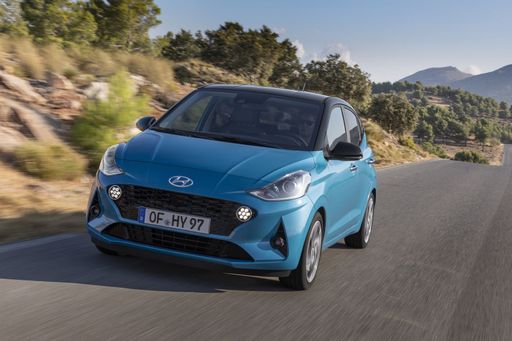 @ hyundai.news
@ hyundai.news
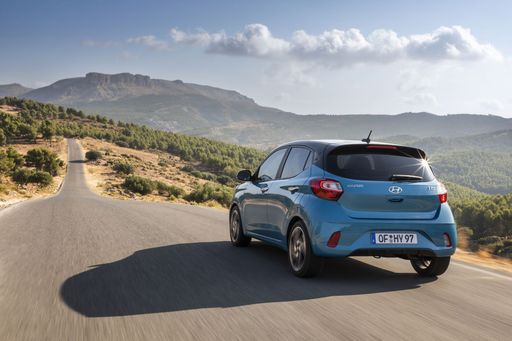 @ hyundai.news
@ hyundai.news
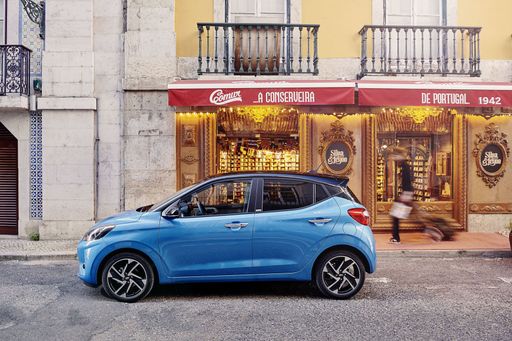 @ hyundai.news
@ hyundai.news
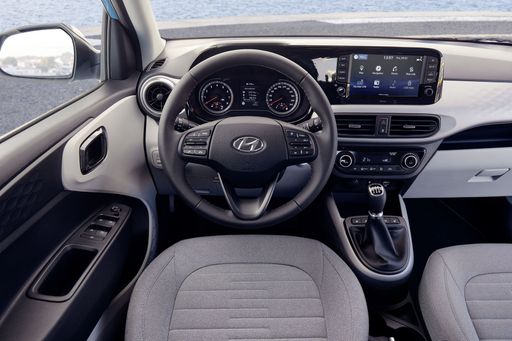 @ hyundai.news
@ hyundai.news
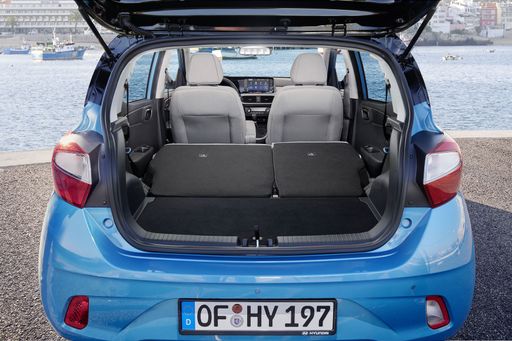 @ hyundai.news
@ hyundai.news
BMW X5
The BMW X5 embodies a perfect blend of luxury and performance, offering a driving experience that is both dynamic and comfortable. Its elegant design is complemented by a spacious, high-quality interior that prioritises driver and passenger comfort. Advanced technology features ensure that the X5 meets the demands of modern drivers, providing both entertainment and safety on the road.
details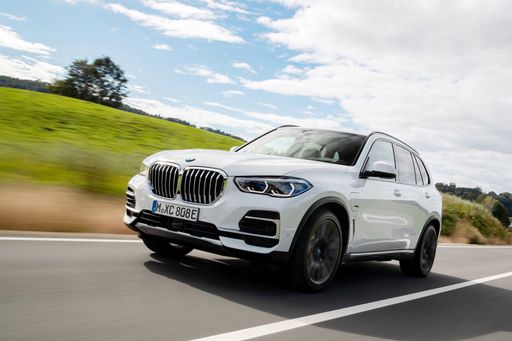 @ press.bmwgroup.com
@ press.bmwgroup.com
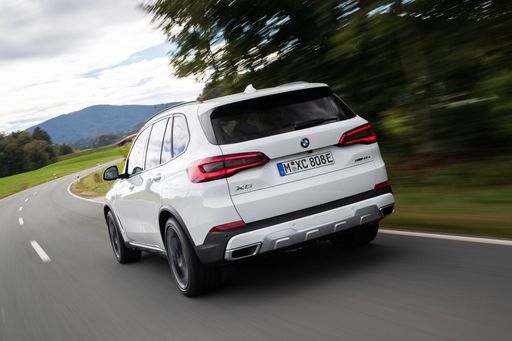 @ press.bmwgroup.com
@ press.bmwgroup.com
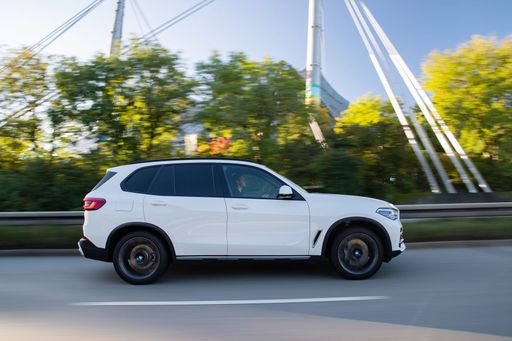 @ press.bmwgroup.com
@ press.bmwgroup.com
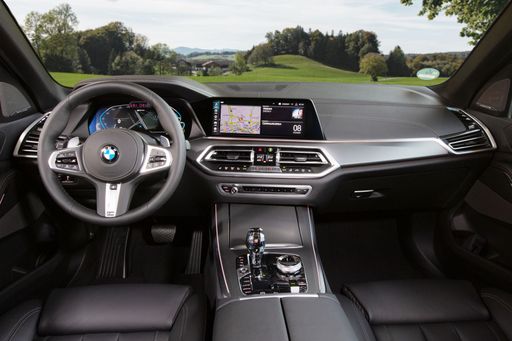 @ press.bmwgroup.com
@ press.bmwgroup.com
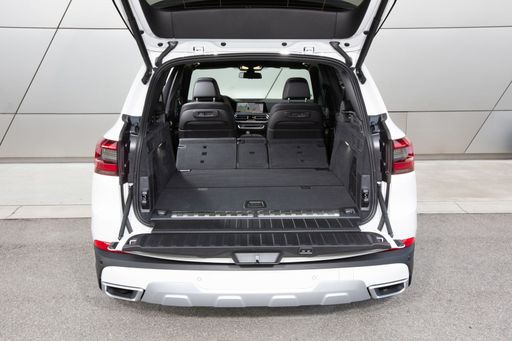 @ press.bmwgroup.com
@ press.bmwgroup.com

|

|
|
|
|
Costs and Consumption |
|
|---|---|
|
Price
14600 - 19000 £
|
Price
77100 - 143500 £
|
|
Consumption L/100km
4.9 - 5.5 L
|
Consumption L/100km
0.8 - 12.9 L
|
|
Consumption kWh/100km
-
|
Consumption kWh/100km
-
|
|
Electric Range
-
|
Electric Range
105 km
|
|
Battery Capacity
-
|
Battery Capacity
25.70 kWh
|
|
co2
110 - 124 g/km
|
co2
19 - 291 g/km
|
|
Fuel tank capacity
36 L
|
Fuel tank capacity
69 - 83 L
|
Dimensions and Body |
|
|---|---|
|
Body Type
Hatchback
|
Body Type
SUV
|
|
Seats
4 - 5
|
Seats
5
|
|
Doors
5
|
Doors
5
|
|
Curb weight
996 - 1099 kg
|
Curb weight
2240 - 2495 kg
|
|
Trunk capacity
252 L
|
Trunk capacity
500 - 650 L
|
|
Length
3670 - 3675 mm
|
Length
4935 - 4948 mm
|
|
Width
1680 mm
|
Width
2004 - 2015 mm
|
|
Height
1480 - 1483 mm
|
Height
1755 - 1765 mm
|
|
Payload
344 - 423 kg
|
Payload
565 - 705 kg
|
Engine and Performance |
|
|---|---|
|
Engine Type
Petrol
|
Engine Type
Diesel MHEV, Petrol MHEV, Plugin Hybrid
|
|
Transmission
Manuel, Automatic
|
Transmission
Automatic
|
|
Transmission Detail
Schaltgetriebe, Automatisiertes Schaltgetriebe
|
Transmission Detail
Automatikgetriebe
|
|
Drive Type
Front-Wheel Drive
|
Drive Type
All-Wheel Drive
|
|
Power HP
63 - 90 HP
|
Power HP
298 - 625 HP
|
|
Acceleration 0-100km/h
11.4 - 18.4 s
|
Acceleration 0-100km/h
3.9 - 6.1 s
|
|
Max Speed
143 - 175 km/h
|
Max Speed
233 - 250 km/h
|
|
Torque
93 - 172 Nm
|
Torque
540 - 750 Nm
|
|
Number of Cylinders
3 - 4
|
Number of Cylinders
6 - 8
|
|
Power kW
46 - 66 kW
|
Power kW
219 - 460 kW
|
|
Engine capacity
998 - 1197 cm3
|
Engine capacity
2993 - 4395 cm3
|
General |
|
|---|---|
|
Model Year
2024
|
Model Year
2023 - 2024
|
|
CO2 Efficiency Class
C, D
|
CO2 Efficiency Class
G, B
|
|
Brand
Hyundai
|
Brand
BMW
|
Hyundai i10
Introduction to the Hyundai i10
The Hyundai i10 has consistently proven to be a dependable and stylish companion for urban driving. Known for its compact design and efficiency, this hatchback offers a perfect blend of modern aesthetics and practicality, making it a popular choice for city dwellers and small families alike.
Performance and Efficiency
The Hyundai i10 is available with both manual and automatic transmissions, catering to various driving preferences. Engine power ranges from 63 to 90 PS, providing a versatile driving experience for both novice and seasoned drivers. The fuel consumption varies between an impressive 4.9 to 5.4 litres per 100 kilometres, fitting for those looking to minimise fuel costs while also reducing their carbon footprint.
Engine and Transmission
Equipped with a choice of 1.0-litre or 1.2-litre engines, the i10 offers up to 172 Nm of torque, ensuring lively performance. The models feature front-wheel-drive configurations, allowing for smooth handling and reliable road performance. The car excels in city driving but is equally capable on longer journeys.
Interior and Comfort
Despite its compact size, the Hyundai i10 does not compromise on interior space and comfort. It accommodates four to five occupants comfortably, offering sufficient legroom and headroom. Its flexible seating arrangement and a 252-litre boot make it ideal for both quick trips and weekend getaways.
Safety and Technology
Safety remains a priority with Hyundai, and the i10 is no exception. It comes equipped with multiple airbags, stability control, and advanced braking systems. Technology-wise, the i10 features a user-friendly infotainment system with smartphone connectivity, ensuring a pleasant and connected drive.
Design and Style
The Hyundai i10’s design is both modern and sleek, making it stand out in the compact hatchback segment. With a length ranging from 3670 to 3675 mm, a width of 1680 mm, and a height of 1480 to 1483 mm, the i10 strikes a perfect balance between style and functionality.
Affordable Pricing and Value
The i10 is available in several trims including the Select, N Line, and Prime, among others, with prices ranging from €16,990 to €22,190. Considering its features and low running costs — with monthly expenses estimated between €694 to €793 — the Hyundai i10 offers substantial value for those seeking an economical yet stylish hatchback.
Conclusion
The Hyundai i10 combines efficiency, modern design, and practicality in a compact package. Whether you are seeking a reliable city car or an economical daily driver, the Hyundai i10 is a strong contender worth considering in the compact car market of 2024.
BMW X5
The BMW X5: Setting the Benchmark for Performance and Luxury
As one of the pioneers in the luxury SUV segment, the BMW X5 continues to set new standards with its blend of performance, comfort, and cutting-edge technology. The latest iterations offer a range of powerful engines, advanced hybrid systems, and a suite of innovative features that cement its status as a premium choice for discerning drivers.
Engine Power and Hybrid Innovations
The BMW X5 is available with a choice of robust powertrains, including diesel, petrol, and plug-in hybrid options. The range-topping models showcase impressive power outputs, with the potent X5 M Competition boasting 625 PS. Meanwhile, the plug-in hybrid models, such as the xDrive50e, demonstrate BMW's commitment to sustainability by offering remarkable efficiency with an electric-only range of up to 97 km and a CO2 efficiency class of as low as 21 g/km.
Technological Advancements
The 2023-2024 BMW X5 integrates state-of-the-art technology to enhance the driving experience. The latest versions come equipped with a Steptronic Sport automatic transmission system, ensuring seamless gear shifts and optimal performance. The xDrive all-wheel-drive system guarantees superior traction and control, regardless of the driving conditions, making it perfect for both urban environments and off-road adventures.
Design and Dimensions
With sleek exterior dimensions, the BMW X5 exudes an aura of elegance and power. Measuring up to 4948 mm in length, 2004 mm in width, and up to 1765 mm in height, it presents a commanding road presence. Inside, the SUV offers ample space with a boot capacity ranging from 500 to 650 litres, ensuring that you have all the room needed for both everyday items and larger cargo.
Comfort and Interior Features
The X5's interior is a masterclass in luxury and functionality, designed to offer maximum comfort for all occupants. With seating for five, the cabin is crafted with the finest materials and hosts a range of technological features, including an advanced infotainment system and intuitive cockpit controls. The M Sportpaket configurations further enhance the vehicle's sporty pedigree with premium equipment and design details.
Performance and Handling
The BMW X5 demonstrates impressive dynamics, with acceleration from 0-100 km/h achievable in just 3.9 to 6.1 seconds, depending on the model. Its powerful engines and sport-tuned suspension provide exceptional agility and stability, making the X5 not only a comfortable cruiser but also a thrilling performer on twisty roads.
Economical Considerations
Despite its premium offerings, the BMW X5 is designed with efficiency in mind. Fuel consumption figures for the X5 range from 0.9 to 12.9 L/100 km across different powertrains, providing options for varying needs and driving styles. The monthly costs to run a BMW X5 range from €2070 to €3383, underlining its position as a luxury SUV option with significant value.
Conclusion
The BMW X5 remains a formidable contender in the luxury SUV market, thanks to its amalgamation of power, efficiency, and advanced technology. With a host of choices in terms of engine types and trim levels, there's an X5 to suit the preferences of any driver looking for excellence without compromise. It's not just a vehicle; it's a statement of refined performance.
The prices and data displayed are estimates based on German list prices and may vary by country. This information is not legally binding.
